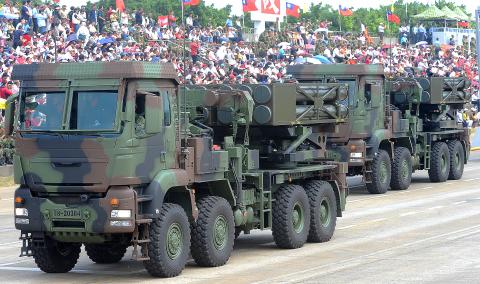Low spending on national defense as well as cuts in projected weapons acquisition, are signs that the armed forces are moving away from a combat-oriented to a relief-oriented military role and that detente in the Taiwan Strait is “unilateral,” critics of President Ma Ying-jeou’s (馬英九) administration have said.
During the presidential campaign in 2008, Ma vowed to bring spending on national defense to 3 percent of GDP, a pledge that he has not met in his four years in office. The proposed national defense budget for next year has been set at NT$314.15 billion (US$10.59 billion), lower than the NT$317.2 billion for this year.
China, meanwhile, has increased its military spending by double digits for most of the past decade, opposition lawmakers said, adding that this highlighted ignorance about the true nature of the Chinese threat on the part of the Ma administration.

Photo: Liu Hsin-de, Taipei Times
This year, China’s declared military budget will rise 11.2 percent to 670.27 billion yuan (US$106.41 billion), a figure that the Pentagon and military analysts argue does not reveal actual levels.
Beyond a failure to meet the target defense spending, appropriations for next year also indicate a shift away from combat readiness to operations other than war, predominantly relief operations, reflecting Ma’s 2009 announcement that natural catastrophes were now Taiwan’s “No. 1 enemy.”
The Chinese-language United Daily News reported on Sunday that initial plans by the army to procure 57 domestically produced Ray Ting-2000 (“Thunder 2000”) multiple rocket launchers for a total of NT$14.45 billion had been slashed by one-quarter in next year’s budget. According to the report, the Ministry of National Defense ordered in July last year that production be dropped to 43 launch vehicles, which are to be divided into three battalions. The budget for the acquisition has reportedly been cut to NT$13.22 billion.
Meanwhile, the ministry has set aside NT$860 million for eight new projects, of which more than half are to meet non-combat needs. Among the earmarked funds, NT$430 million has been set aside to purchase 73 excavators and loaders and NT$45 million to buy 128 rubber rafts.
The army said the purchases were to “strengthen disaster prevention and rescue capabilities and to expand the army’s capability to speedily repair roads and dredge waterways and reservoirs.”
Opposition lawmakers commenting on next year’s defense budget said appropriations failed to ensure the nation had the means to guarantee its defenses.
“The Ma administration has continually scaled back its military spending even though China’s threat to Taiwan has continued to rise over the past few years,” Democratic Progressive Party Legislator Hsiao Bi-khim (蕭美琴) was quoted as saying at the weekend.
Despite the relative calm in the Taiwan Strait since Ma’s election, Hsiao said the lack of reciprocity was impossible to ignore.
“The detente is just unilateral,” she said, pointing to the 1,600 ballistic and cruise missiles China has aimed at Taiwan — 200 more than last year, according to a report by the ministry on the People’s Liberation Army that was submitted to the legislature last week.
Additional reporting by AFP and Jake Chung

ANOTHER EMERGES: The CWA yesterday said this year’s fourth storm of the typhoon season had formed in the South China Sea, but was not expected to affect Taiwan Tropical Storm Gaemi has intensified slightly as it heads toward Taiwan, where it is expected to affect the country in the coming days, the Central Weather Administration (CWA) said yesterday. As of 8am yesterday, the 120km-radius storm was 800km southeast of Oluanpi (鵝鑾鼻), Taiwan’s southernmost tip, moving at 9kph northwest, the agency said. A sea warning for Gaemi could be issued tonight at the earliest, it said, adding that the storm is projected to be closest to Taiwan on Wednesday or Thursday. Gaemi’s potential effect on Taiwan remains unclear, as that would depend on its direction, radius and intensity, forecasters said. Former Weather Forecast

As COVID-19 cases in Japan have been increasing for 10 consecutive weeks, people should get vaccinated before visiting the nation, the Centers for Disease Control (CDC) said. The centers reported 773 hospitalizations and 124 deaths related to COVID-19 in Taiwan last week. CDC Epidemic Intelligence Center Director Guo Hung-wei (郭宏偉) on Tuesday said the number of weekly COVID-19 cases reported in Japan has been increasing since mid-May and surpassed 55,000 cases from July 8 to July 14. The average number of COVID-19 patients at Japan’s healthcare facilities that week was also 1.39 times that of the week before and KP.3 is the dominant

The Chinese Communist Party’s (CCP) working group for Taiwan-related policies is likely to be upgraded to a committee-level body, a report commissioned by the Mainland Affairs Council (MAC) said. As Chinese President Xi Jinping (習近平) is increasingly likely to upgrade the CCP’s Central Leading Group for Taiwan Affairs, Taiwanese authorities should prepare by researching Xi and the CCP, the report said. At the third plenary session of the 20th Central Committee of the CCP, which ended on Thursday last week, the party set a target of 2029 for the completion of some tasks, meaning that Xi is likely preparing to

US-CHINA TRADE DISPUTE: Despite Beijing’s offer of preferential treatment, the lure of China has dimmed as Taiwanese and international investors move out Japan and the US have become the favored destinations for Taiwanese graduates as China’s attraction has waned over the years, the Ministry of Labor said. According to the ministry’s latest income and employment advisory published this month, 3,215 Taiwanese university graduates from the class of 2020 went to Japan, surpassing for the first time the 2,881 graduates who went to China. A total of 2,300 graduates from the class of 2021 went to the US, compared with the 2,262 who went to China, the document showed. The trend continued for the class of 2023, of whom 1,460 went to Japan, 1,334 went to